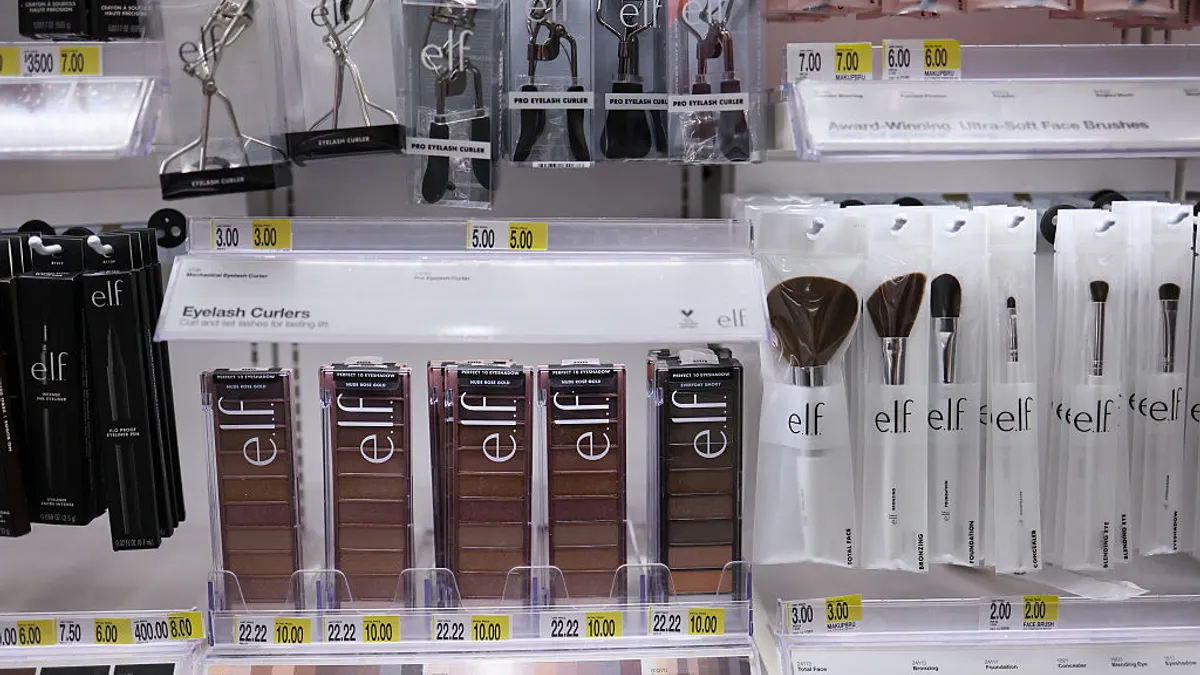Cosmetic companies have spent the year realigning business strategies as tariff and consumer spending-related headwinds cloud financial outlooks. For most, the adjustments led to a sharpened focus on AI.
E.l.f. Beauty, Coty and Estée Lauder Companies are three industry giants beginning to reap benefits from AI endeavors, such as faster innovation timelines and reduced operational costs.
“One thing about AI is that it's not just [a] finance, accounting, IT initiative,” Mandy Fields, SVP and CFO at E.l.f., said during a fireside chat with Goldman Sachs Friday, following its latest earnings report earlier this month. “It's really an enterprisewide initiative that can unlock efficiencies overall.”
Known for its namesake cosmetics and the recently acquired Rhode skincare brand, the company has prioritized technology investments this year. E.l.f. implemented a new SAP ERP during the summer and has been leveraging AI in its marketing department.
The company is also using AI to improve customer experiences on social media, according to Tarang Amin, chairman and CEO of E.l.f.
“For the longest time, we weren't able to answer every DM we got or every consumer message we got,” Amin said. “That's 100% driven by AI now.”
E.l.f. is fortifying its technology foundation before exploring AI adoption in other areas.
“Before you can get on a full AI journey, you have to make sure that the data is in the right place and accessible and that you can build on top of that,” Fields said. “That's really the stage that we're in but, certainly, AI will play a role in terms of efficiency and automation for us over time.”
The company saw its net sales increase 14% year over year to $343.9 million for the second quarter, which ended Sept. 30.
Moving initiatives forward
Some beauty brands are a bit further along in their AI journey.
Coty and ELC are exploring AI agents following initiatives to strengthen their technology foundation and implement generative technologies.
Coty, the parent company to several brands including CoverGirl, Rimmel and Kylie Cosmetics, is accelerating its AI strategy this year as part of a new roadmap shared last quarter, according to executives. Agentic AI is a top priority.
“We’re already seeing some early benefits, and expect them to ramp up over the coming year,” CEO Sue Nabi said in prepared remarks for the company's Q1 2026 earnings report earlier this month. “These initiatives are optimizing fixed cost investments across back-end functions and reducing the cost of content creation, freeing up funds for working media.”
The company reported a net revenue decline of 6%, but expects to return to profitable sales growth in the second half of the fiscal year.
Last quarter, the company promoted CIO Jérôme Auvinet to chief information, digital innovation and business services officer as part of an internal shift to shore up governance of the initiatives.
“AI is already, in fact, embedded into Coty's core processes, not as a future ambition, but as a present-day reality,” Nabi said during the Q4 2025 earnings call in August.
The AI inroads come on the heels of last year’s ERP upgrade, the creation of an AI hub and the latest stage of a digital transformation plan initiated in 2020.
ELC has also prioritized AI agent exploration after ramping up innovation efforts, creating a tool to help employees analyze archives and company data in partnership with Microsoft.
AI initiatives have produced identifiable gains, according to Stéphane de la Faverie, CEO and president of ELC. The executive said AI is helping to reduce risks in new packaging and improve confidence in purchasing materials, leading to cost savings and faster development.
“When I say that we're going to triple the innovation that we bring to market in less than a year, it's not by cutting corners, it's by simply building efficiency… via AI that reduces the risk, increases the predictability of the result that allows us to just bring more product to market,” de la Faverie said during an investor conference in September.
ELC is also putting AI closer to the core of its business. Last month, the company opened a Fragrance Atelier in Paris, which features an AI-enabled perfume creation process.
“Our team will blend state-of-the-art technology, data-driven intelligence, leveraging AI and olfactive expertise to craft the next generation of extraordinary scents, all while innovating much quicker than we have in the past,” de la Faverie said in October during the company’s Q1 2026 earnings call.
The company said it had a strong start to fiscal 2026 as it returned to organic sales growth and expanded its operating margin for the first time in four years.














